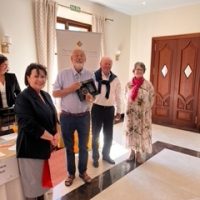I was on one of Spain’s magnificent high-speed trains the other day, coming home from Madrid. We were travelling at over 300 kph across the spectacular wild scenery, a complimentary glass of white wine on my table with not a ripple on its surface.
Moving from the UAE to Spain
By Charles Hutchinson
This article is published on: 12th September 2024

I was lucky enough to be travelling Preferential (1st class) as Economy was full up. But the price didn’t matter because I have attained the age where I am entitled to a Gold Card which reduces train tickets by as much as 40% – I was travelling First for the price of Second!
Opposite me sat a kindly looking fellow and soon we began to chat. He was a senior airline executive with one of the Arabian Gulf airlines and was soon to retire. He was on a looksee mission as he and his wife had decided to move to Southern Spain where the climate is similar to Dubai’s, their home for over 15 years.
The thought of moving back to their native damp grey Britain was daunting.

It was a fortunate meeting as I was soon able to help him cut some corners and avoid some pitfalls which had been laid in his path by so called knowledgeable advisers in the UAE.
Relocating from Dubai to Spain can be an exciting move, but it also involves several important steps to ensure a smooth transition.
Here’s a breakdown of the key aspects you may need to consider:
Personal Finances
Taxation: I was able to present him with a copy of our Spanish Tax Guide which shows the different tax obligations and, once you become a tax resident (living here for more than 183 days), that you’ll need to pay taxes on your global income. I also advised him to check the details of the double taxation agreements between Spain and the UAE. It is very important to engage a licensed and regulated (in Spain) financial adviser to assist you with all these matters.
Spanish Bank Account: You’ll need a Spanish bank account to pay rent, utilities, and other expenses. It is also advisable to have an offshore bank account where the bulk of any cash should be kept as some Spanish institutions have the habit of raiding one’s account without permission!
Visas and Residencias
It seemed he wasn’t fully aware of the options available to him in legally securing his residency here. As a UAE resident, you’ll need to apply for a Spanish visa unless you hold citizenship of an EU country. There are several types of visas. Non-Lucrative Visa: if you plan to retire or live off savings, this visa allows you to stay without working. Golden Visa for individuals investing in property or businesses in Spain (minimum investment of €500,000). Work Visa: If you have secured a job in Spain. Student Visa if you are moving for educational purposes. Residency Permit: once you have arrived in Spain, you’ll need to apply for a residence permit, if none of the above apply.
Driving
It is important to check if you can exchange your UAE driving licence for a Spanish one, or if you’ll need to undergo a test. You have six months to drive on your foreign license once you’re a resident here.
Accommodation
Many people moving here begin by renting to see where they would like to live within a certain area. An alternative to this is to retain a Relocation Agent who will line up properties to your specification before you come over. This saves time and money and can be very rewarding. You can also use this service if you wish to rent instead.
Lawyers and Gestors (Para Legals)
It is important to retain a lawyer or Gestor who specialises in immigration or real estate to help you navigate legal requirements such as contracts, taxes, and residency permits. A good reputable relocation agent can also provide this service.
Healthcare
Spain has an excellent public healthcare system and is available once you obtain your residency permit (Residencia). Many expats opt for private health insurance and there is a wide choice here. In some cases, it is mandatory for gaining residency.
General Insurance
If your UAE general insurance company does not have an EU entity, then you will need to reinsure here. This is required for your car(s) and highly desirable for your purchased property and its contents. The easiest route is a general insurance broker (of which there are many here) and who will also organise your medical insurance, if needed.
Shipping and Moving Services
If you have furniture, cars, or other personal belongings to move, the relocation agent can arrange this as there are many excellent international removals companies with branches here. They will be familiar with customs formalities and on used personal belongings, note there is no import duty. However, on a personal vehicle, you will have to pay IVA (VAT) if you decide to keep hold of it after 6 months.
Schooling
If you have children of that age, Spain offers free public schooling but classes are conducted in Spanish. There is a wide choice of Private/International Schools which offer international or UK curriculums.
Lifestyle
The lifestyle in Spain can be quite different from Dubai’s. The pace of life tends to be more relaxed here, with emphasis on family time, meals, and socialising.
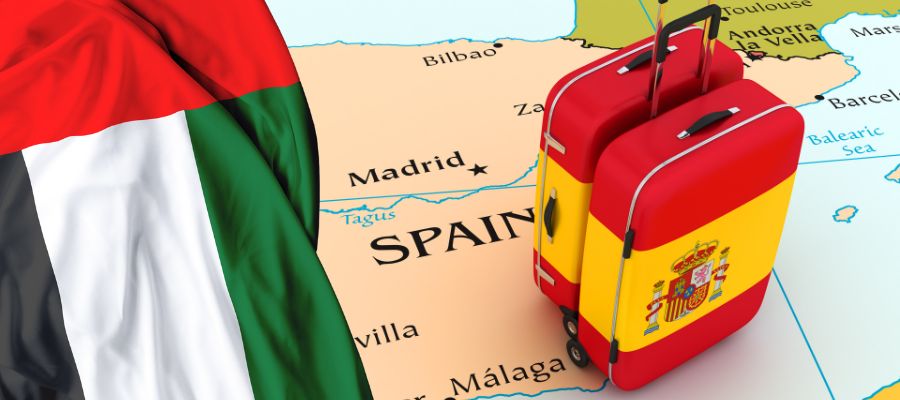
The Spanish are a very hospitable people and many speak sufficient English to make themselves clearly understood. But to make life easier and to fully appreciate the wonders of Spain, it is advisable to learn Spanish as early as possible after arrival.
On arrival in Malaga, we parted company full of bonhomie and he was now armed with sufficient information to get started quickly and effectively with his search. He also has my contact details and so he might even become a client! He certainly indicated he wanted to meet again.
If you are contemplating such a move from the Gulf or from any other jurisdiction, do please contact me for a no obligation and complimentary chat on my below details:
Sources: Integrated Relocation Services, Keystone Propery Finders
Is there life after BRICs and what has happened to China?
By Charles Hutchinson
This article is published on: 7th September 2024

There was a time not so long ago when the BRIC markets were the darlings of the investment world. Certainly many of our Balanced risk and Adventurous risk clients were recommended to hold funds of such renowned investment houses as HSBC and Jardine Fleming. So what has happened since?
The Brazil economy has been destroyed by poor leadership and corruption; Russia has been banished to the outer fringes of the civilised world; democratic India is developing into a first world giant economy which is forecast to match China by the mid 30’s; and China? The communist Chinese economy has certainly had its share of problems since the beginning of the ‘20s, which persistently drag its markets down. They have continued to underperform due to a combination of economic, regulatory, and geopolitical factors.
Here are some key reasons:
China’s economic recovery post-COVID-19 has been slower than expected. Domestic consumption remains sluggish, and growth in key sectors like real estate has faltered. This has weighed heavily on investor confidence.
The manufacturing sector, traditionally a pillar of China’s economy, has faced challenges due to weakened global demand and supply chain disruptions. This has further dampened economic growth, impacting market performance.
The ongoing crisis in China’s property sector, exemplified by the struggles of major developers like Evergrande, has led to significant financial instability. The property market, which constitutes a large part of China’s economy, has seen declining prices and sales, eroding wealth and further depressing consumer spending. Many property developers are heavily indebted, and their financial troubles have rippled through the economy, affecting banks and other sectors linked to real estate.
The Chinese government’s regulatory crackdown on the technology sector has created significant uncertainty.
Major tech companies have faced fines, restructuring orders and other regulatory actions which have spooked investors and led to a sell-off in these stocks. Beyond tech, the government’s broader regulatory agenda, targeting education, gaming, and other industries, has increased investor caution. The unpredictability of regulatory interventions has made both domestic and foreign investors wary.
Foreign investors have been pulling capital out of China due to concerns over economic prospects, regulatory risks, and geopolitical uncertainties. This capital flight has further weakened stock prices. Domestic investors are also hesitant, with many preferring safer assets due to uncertainty about the direction of the economy and government policies.

Lastly, ongoing geopolitical tensions, particularly with the United States, have created an overhang on the market. Issues such as trade disputes, technology bans and the delisting of Chinese companies from U.S. exchanges have all contributed to negative sentiment.
The risk of decoupling between China and the West, especially in critical sectors like technology, has raised concerns about the future growth prospects of Chinese companies, further depressing stock prices.
There seems to be little immediate relief in sight unless there are significant improvements in economic conditions, regulatory clarity and geopolitical stability. The Spectrum IFA Group, along with many other advisers, are wary of our clients holding positions in the Chinese market through collective funds. But if you are a fan of Asia and other Emerging markets or just simply want to diversify your portfolio further, then one should perhaps look at India rather more closely.
For more information on this and keeping your portfolio safe within efficient and effective tax structures, please contact me, Charles Hutchinson, via the form below.
Sources. Morgan Stanley, Wall St. Journal
What is going on in the global markets?
By Charles Hutchinson
This article is published on: 5th September 2024

Many of my clients have expressed their worries to me in recent weeks. The axiom “When Wall Street sneezes, the world catches a cold” has never been truer than now. Fears with the US economy sent global markets cascading overnight.
This was followed by a modest recovery as investors bought in at lower levels and the debate ensued as to exactly how well founded were these fears. Markets are still down and will probably remain so until some of these fears are addressed or diminish.

Overall, the U.S. economy in 2024 is not in dire straits, but it is facing significant headwinds. While the labour market remains strong and consumer spending is resilient, high inflation, rising interest rates, and concerns about future growth present challenges.
The overall outlook is one of cautious optimism, with the potential for both recovery and further difficulties depending on how these factors evolve. Let’s look at the US economy in closer detail:
Rising Government Debt Levels: The U.S. national debt has continued to grow, raising concerns about long-term fiscal sustainability. High debt levels may limit the government’s ability to respond to future economic crises.
Rising Interest Rates: To combat inflation, the Federal Reserve has raised interest rates several times. While this is intended to cool inflation, it also increases borrowing costs for consumers and businesses, potentially slowing economic growth.
Housing Affordability Issues: High mortgage rates, combined with rising home prices, have made housing less affordable for many. This has led to a slowdown in home sales and construction, affecting related industries.
Persistent Inflation: Inflation has been a significant challenge, with the Consumer Price Index (CPI) rising at rates above the Federal Reserve’s 2% target. This has eroded purchasing power for many Americans, particularly those on fixed incomes.
Recession Fears: There is ongoing concern about a potential recession. While not inevitable, some economic indicators, such as inverted yield curves and slowing manufacturing activity, have raised alarms.
To balance these, there is some GOOD news:
Robust Corporate Earnings: Many companies, particularly in the tech sector, have reported strong earnings, driven by innovation, digital transformation, and global expansion
Resilient Consumer Spending: Despite challenges, consumer spending has held up, supported by strong job growth and wage increases. This is crucial since consumer spending drives about 70% of U.S. economic activity.
Low Unemployment: Unemployment has remained low, hovering around 3.8% as of mid-2024. Job creation continues in several sectors, reflecting a resilient labour market.

So, as a long-term investor, what should I do until markets pick up again?
Stay invested with your trusted adviser or portfolio manager to ensure that your original investment strategy is not derailed by short-term market events. He/she will also be well placed to capitalise on investment opportunities during spells of market volatility. NEVER try to time the markets with big bets on ‘buying low or selling high’ – ALWAYS stay invested through uncertain times. It has been proven time and time again that this is the safest and most effective principle for achieving long-term investment success.
For further information on discretionary managed or advised portfolios within extremely effective tax structures, please contact me, Charles Hutchinson, via the form below.
Sources: Morgan Stanley, The Economist and the London FT
Arts Society de La Frontera
By Charles Hutchinson
This article is published on: 23rd November 2023

The Spectrum IFA Group again co-sponsored an excellent Arts Society de La Frontera lecture on the 15thNovember at the impressive San Roque Golf & Country Club on the Costa del Sol. We were represented by one of our local and long-serving advisers, Charles Hutchinson, who attended along with our co-sponsors Currencies Direct represented by Ignacio Ortega and Carol Schleisman.
The Arts Society is a leading global arts charity which opens up the world of the arts through a network of local societies and national events throughout the world. With inspiring monthly lectures given by some of the UK’s top experts, together with days of special interest, educational visits and cultural holidays, the Arts Society is a great way to learn, have fun and make new and lasting friendships.
At this excellent event, over 80 attendees were given a talk on The Real Richard III by Tobias Capwell. Tobias is the curator of Arms and Armour at the Wallace Collection in London and an internationally acknowledged authority on Medieval and Renaissance armour and weapons. He is the author of numerous books on the subject and has been involved in many television programmes on BBC4 and Channel 4. In 2015, Toby had the unusual honour of serving as one of the two fully armoured mounted knights escorting the remains of King Richard III from the battlefield of Bosworth Field to their final resting place in Leicester Cathedral.. It would be no exaggeration to say that his lecture was incredibly gripping and interesting and at times very amusing. His knowledge of his subject was responsible for him being closely involved in the recent feature film “The Lost King” together with all the TV programmes of how they found and identified the king’s remains.
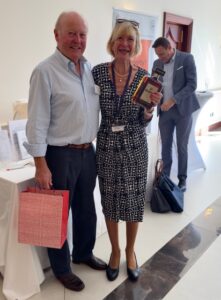
The talk was followed by a drinks reception which included a free raffle for prizes including CH supplied book The Search for Richard III and a large decorative candle. Currency Direct also supplied a Cava presentation case and 2024 diaries.
All in all, it was a very good turnout and a successful event at a wonderful venue. The Spectrum IFA Group was very proud to be involved with such a fantastic organisation and we hope to have the opportunity again at the February 2024 lecture.
Top tips for moving to Spain in 2023
By Charles Hutchinson
This article is published on: 1st August 2023

Spain is an interesting and beautiful country with a fantastic lifestyle and very hospitable people. I have been in business here with my family for nearly 30 years and have learnt to identify the pitfalls. Here’s how to avoid some of them so you don’t spoil your early days here:
1. Visa and residency permits. It is important to seek advice from a lawyer, gestor or financial adviser specialising in assisting expatriates in Spain as to which visa or permit you need. Since Brexit this has become essential, especially for UK nationals who no longer have the right of abode in the EU.
2. Residency. Again, it is important to consult on the various ramifications of residency, particularly the timing of physically moving from your previous jurisdiction (such as the UK) to Spain. For example, the UK has the 90 day rule whereby if you spend more than 3 months there in any 12 months, you are deemed to be tax resident. In Spain, it is the 183 day rule. However, should your “centre of vital interests” be deemed to be here (if you have children in school here or you are running a business from here), then despite being physically here less than 183 days, you may well be deemed to be a fiscal resident.
3. Foreign pensions and tax efficient investments. While they may be tax efficient in your country of origin, they may not be here. For example, if you are about to draw down on your pension where there is a 25% PCLS (cash lump sum) available tax free, it may not be so here and could be taxed at full income tax rates. Likewise, UK ISAs and some UK National Savings products will probably not be tax free here. You should consider encashing these while UK resident and switching into tax efficient alternatives here (more on that later).
4. Choice of new country of residence. For me this is a no brainer. Over the years I have met many potential and future clients who let taxation rule their lives and dictate where they should live. I genuinely feel that if you and your partner (and children) want to be happy, choose the place that offers what you and yours need for a happy life. There are still too many people who choose their new home on the basis that there is less or no taxation. A frequent typical example would be a couple who spend 180 days in Spain, then 90 days in the UK, one month on a cruise and one month in Florida. While the husband might be rubbing his hands in “Fiscal Nomad” glee, his poor wife is just fed up wandering the world as Mrs Nomad and not being able to call anywhere “home” (please also remember my earlier reference to “centre of vital interests”).
5. Taxation. There are certain taxes in Spain which are foreign to many from other jurisdictions. Typically this might be wealth tax or inheritance tax (IHT) between spouses or common law partners. Please see an earlier article I wrote about how Andalucia might currently be considered a tax haven. The threshold on wealth tax has now been raised here (and in Madrid) so that most couples can avoid it. In Andalucia, there is effectively no more inheritance tax – if you plan carefully. By selecting the correct structure in which to hold your investments, IHT no longer applies between partners (more on this later).
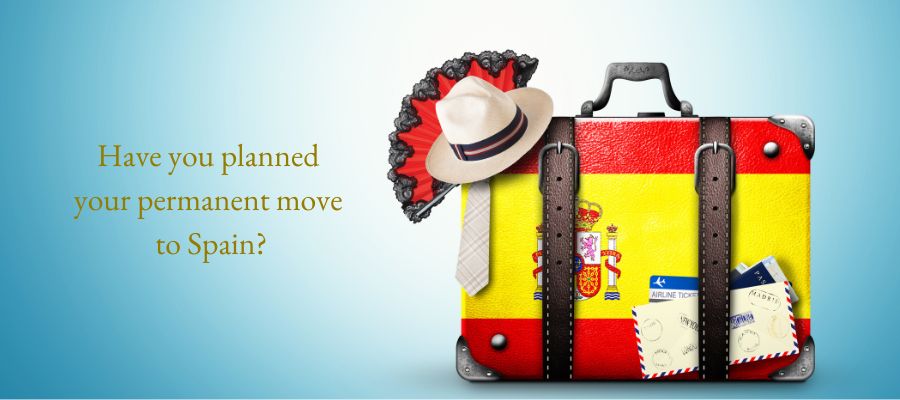
6. Tax returns and declaration of foreign assets. Timing is all important. When you arrive here, it is important to seek advice as to when you should make your first tax return. As usual in Spain, there is the official rule and the unofficial version. As long as there is a provable intent to make one’s first return, one is not breaking the law. It is always easier to make a return for the tax year beginning after you arrive. This often coincides with the fact you have not been here for more than 183 days prior to the beginning of the tax year (1st January). Returns are made by end of June of the following year, so there is plenty of time to decide when to start. You can of course make a return for a period beginning part way through the tax year. This is sometimes done to coincide with date you left your country of previous tax residence but it is not essential. Modelo 720 (Declaration of Foreign Assets) is always made in March of the following year, with regard to the previous tax year. Note that certificates of tax residency here are only issued after you have made your first return.
7. Capital gains tax (CGT) timing. Whenever possible, dispose of any assets which are either CGT free in your previous country or attract a lower tax rate than here while still tax resident in your previous country. For example, your main residence in the UK is free of CGT when disposed of as a UK tax resident, but when you are tax resident here it would be regarded as a second home, even if you are only renting here. Your Spanish home in turn has special tax privileges as a Spanish resident when you come to eventually dispose of it (as an owner).
8. Health insurance. It is important to remember that since Brexit, UK nationals no longer have the privilege of cross border health care. It is however the rule that to obtain a resident permit or visa you must have Spanish recognised health insurance. To avoid stress, investigate options as early as possible.
9. Spanish compliant investment bonds. These are not only recognised here, but also across many EU countries and the UK (where they were pioneered). They are an incredibly effective tax efficient structure provided by several major insurance companies outside of Spain and with offices within the EU. Here in Spain, they are a flexible, 100% secure (under EU law) means of holding investment funds and cash almost without tax exposure. Only when making regular (income) or lump sum withdrawals is there a withholding tax on the growth element of the withdrawal. Even then, the tax rate is far lower than normal income tax. IHT can also be avoided and you can retain your previous investment manager to manage your portfolio. You should consult your new financial adviser in Spain for details.
10. Happiness is where the heart is. Observe these steps and you will begin with less stress and hopefully continue to happily live your lives here for the rest of your days. There is no place like Spain to have a satisfying and rewarding life (just beware when grandchildren heart strings begin to tug if they live somewhere else!)
A tax haven called Andalucia
By Charles Hutchinson
This article is published on: 24th April 2023
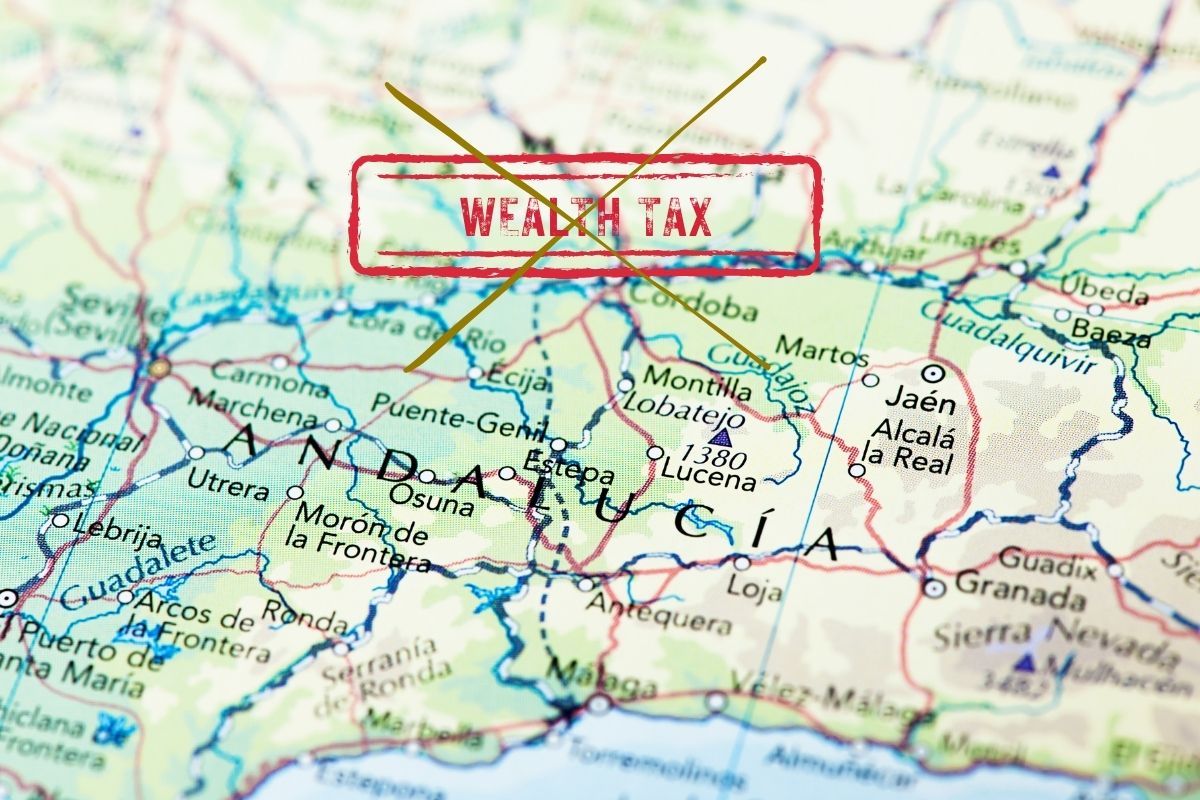
In recent years, the debate surrounding wealth tax has gained significant attention, especially in the context of Spain’s Andalucia region. Andalucia is one of the most populous regions of Spain and has a strong agricultural and tourism-based economy. In September 2022, the Andalucian government announced the abolition of wealth tax.
The decision to abolish wealth tax in Andalucia was based on the regional government’s belief that it was an unfair tax and discouraged investment and economic growth in the region. The tax was seen as a deterrent for high-net-worth individuals (HNWIs) and business owners, who were seen as crucial for job creation and economic stimulation.
However, critics of the decision argued that wealth tax was an important source of revenue for the government and helped to reduce inequality in the region. They argued that the abolition of wealth tax would only benefit the rich and widen the gap between the rich and poor in Andalucia.
To address these concerns and also that it was unfair to all other autonomous regions (except Madrid which also scrapped wealth tax), the Federal government introduced a new tax called solidarity tax. Solidarity tax is a progressive tax that aims to reduce inequality and generate revenue for the government. It is applied to all autonomous regions. If a region has no wealth tax, then the solidarity tax is applied. If, however, a region already has wealth tax in place, then the solidarity tax is removed. The tax is based on a sliding scale, starting with HNW individuals with assets of €3m and above. There are three bands, the lowest rate being 1.7% which rises to 3.5% on assets worth €10m and above.
The introduction of solidarity tax was seen as a positive step by many, as it addressed concerns about inequality and raised much-needed revenue for the government. However, some critics argued that the tax was not enough to make up for the loss of revenue from the abolition of wealth tax. However, it has allowed many to escape wealth tax on assets under €3m, especially if those assets are held jointly. This is seen as attractive by many resident expatriates as it mitigates the impact of wealth tax (in effect there is no wealth tax for a couple on assets below €6m).

In the case of Andalucia, the abolition of wealth tax and introduction of solidarity tax highlights the ongoing debate about the role of taxation in reducing inequality and promoting economic growth. While some argue that wealth tax is an important tool for reducing inequality, others argue that it discourages investment and entrepreneurship. What is clear is that it is part of a concerted move to make the region attractive to those who would stimulate economic growth. For example, inheritance tax has been removed and capital gains tax scrapped on all first homeowners over the age of 65. Income tax is being lowered by at least 4% and water tax has also been abolished. All of which represents a strategic move to lure back permanently those who had moved away, including to nearby Portugal for example. Ten of the top 20 wealth tax payers in 2019 left Andalucia in 2020, resulting in a loss of income for the region of nearly 18 million Euros (3.5 m in wealth tax and 14m in personal income tax).
The Spectrum IFA Group is committed to helping expatriates navigate their way through the taxation minefield. Our disciplined financial advice process ensures that valuable planning opportunities are fully utilised, for optimal tax efficiency on assets, income, investments and, eventually, inheritance for your beneficiaries. By doing so, we can demonstrate, perhaps surprisingly to some, that Andalucia truly is a tax haven, not just in Spain but in a wider European context.
Whether you are planning to move here or are already a full time or part time resident, please contact me for a no fee and no obligation chat – perhaps over a coffee?
Protecting your investments during the Ukraine conflict and beyond
By Charles Hutchinson
This article is published on: 18th April 2023

The ongoing Ukraine conflict has had a significant impact on global financial markets and the value of investments. While it is difficult to predict the exact outcome and duration of the conflict, there are several strategies investors can employ to protect their investments during this uncertain period. Here are some suggestions:
1. Diversify your portfolio: One of the most important strategies for protecting your investments during a period of geopolitical uncertainty is to diversify your portfolio. By investing in a variety of asset classes such as stocks, bonds, commodities, and real estate, you can spread your risk and reduce the impact of any one investment being affected by the conflict.
2. Avoid investments in affected regions: If you are concerned about the impact of this conflict on your investments, it may be wise to avoid investing in companies or industries that are directly impacted. For example, companies that do business in Ukraine or Russia, or companies that rely heavily on imports or exports from these regions, may be more vulnerable to a serious and sustained downturn.
3. Consider safe-haven assets: During times of geopolitical uncertainty, investors often flock to so-called “safe-haven” assets such as gold, US Treasuries, and the Swiss franc. These assets are generally considered to be less risky than other investments and, depending on wider market conditions, can provide a hedge against volatility.
4. Keep an eye on news and developments: It is important to stay informed about developments which may affect financial markets. By keeping a close eye on political and economic news, investors can make informed decisions about their investments and, if necessary, adjust their portfolios accordingly. Note that becoming overly reactive to short term events will usually be counter-productive, but staying informed will also often present valuable opportunities for tactical portfolio adjustments.
5. Take a long-term view: While it can be tempting to react to fluctuations in the financial markets, it is important to remember that successful investing almost always relies on patience and taking a long-term view. Rather than trying to pre-empt short term market direction, it is often more prudent to focus on your long-term investment strategy and stick to your plan.
6. Consult with a suitably experienced financial adviser: If you are uncertain about how to best protect your investments, it may be helpful to consult us. A professional adviser can help you navigate the complexities of the financial markets and provide personalised advice based on your individual goals and risk tolerance.

Points 1 to 4 above are actually the responsibility of the fund managers whom we select for their prowess, long term performance and consistency. It is their job to navigate your investments through uncertain times. Point 5 is vital and it is important to remember the adage “It’s not timing the market, but time in the market, which matters”.
In conclusion, the ongoing conflict in Ukraine presents a challenging environment for investors, but there are strategies that can be employed to protect investments. By diversifying your portfolio, avoiding investments in affected regions, focusing on safe-haven assets, staying informed about the latest developments, considering the long-term and consulting with a financial adviser, you can help protect your investments during this uncertain period.
Arts Society de La Frontera
By Charles Hutchinson
This article is published on: 11th April 2023

The Spectrum IFA Group again co-sponsored an excellent Arts Society de La Frontera “Live” lecture on the 15th March at the newly renovated San Roque Golf & Country Club on the Costa del Sol. We were represented by one of our local and long-serving advisers, Charles Hutchinson, who attended along with our co-sponsors Currencies Direct represented by Ignacio Ortega, Carol Schleisman and Cristina Ruiz. Also present was the society’s European Chairman Jo Ward.
The Arts Society is a leading global arts charity which opens up the world of the arts through a network of local societies and national events throughout the world.
With inspiring monthly lectures given by some of the UK’s top experts, together with days of special interest, educational visits and cultural holidays, the Arts Society is a great way to learn, have fun and make new and lasting friendships.
At this event, over 50 attendees were entertained by a talk on The Manufactured Woman which is the story of Pandora, her box and the reasons for her creation by Mary Sharp of BBC Radio 4 fame. She gave an interesting talk showing comparisons with other created female characters such as Eve in the Bible and Eliza Doolittle in Pygmalion and the later My Fair Lady.
The talk was followed by a drinks reception which included a free raffle for prizes including CH supplied book on Dutch Art and Champagne. Smart Currency Exchange also supplied wine presentation cases with glasses and Brandy.
All in all, it was a good turnout and a successful event at a wonderful venue. The Spectrum IFA Group was very proud to be involved with such a fantastic organization during its current global expansion and we hope to have the opportunity again at the November lecture.
Moving to Spain and Wealth Tax
By Charles Hutchinson
This article is published on: 6th October 2022

I was flying back home from London at the weekend and I was sitting beside a fellow Brit who seemed very pleasant. We got chatting and it turned out he is a keen golfer, lover of warm climes and owns a holiday home in Southern Spain. His wife is a keen gardener. We exchanged pleasantries and he felt frustrated he could not move himself and his wife permanently to Spain. I asked why not? He replied the tax situation in Spain is horrendous from every angle and they have something called Wealth Tax which is unheard of in many countries, including the UK. As a wealthy man, this put it out of the question. He said he had missed the boat regarding a Residencia (TIE) and found queuing for miles at Malaga airport with all the other Brits on returning to the UK from Spain was really unacceptable.
We had over an hour more together on the flight and he was my captive audience. So I proceeded to give him the lowdown on the whole tax situation:
1. Wealth Tax (suspended). From last week, there is no more Wealth Tax for residents and non residents of Andalucia where my companion’s house is located. What or where is Andalucia? Andalucia is a semi autonomous region (one of 17 in Spain) which stretches from the Portuguese border in the West to beyond Almeria in the East and up to Cordoba in the North and is bordered to the South by the beautiful Mediterranean Sea. Its capital is the stunning Seville. Wealth Tax was calculated on the total value of your assets on a varying sliding scale according to the amount. At the upper level it was 2.76% on €10.696m and above. Previously as a resident, you had to pay wealth tax on ALL your worldwide assets. As a non resident, it was only on your Spanish assets.
As a result of the suspension, it is expected that many previously resident expatriates will return from those countries with attractive tax regimes to Andalucia as residents and many first time residents will apply to become permanent residents.
Additionally, the case (tax wise) for coming to live here, these other taxes are just SO friendly:
2. Spanish Succession Tax (IHT) (suspended). This was effectively abolished on 1st January 2018 by granting a 100% allowance on the first €1m and thereafter 99% allowance. Assets sheltered in foreign entities (banks, insurance companies, etc.) which are being inherited by foreign residents (e.g. children living outside of Spain) are also exempt from this IHT.
3. Capital Gains Tax (adjusted). Payable at the same rates by everyone except on the sale of your main residence in Andalucia where it is exempt if you are over age 65.
4. Income Tax (decrease). A decrease by at least 4% p.a. has been announced. On investment income derived from approved EU based Spanish Compliant Investment Bonds, this attracts very low income (savings) tax. We are talking about a drop from a standard income tax upper level rate of around 46% down to a level of between 9% and 11% average over a 20 year period, depending on the amount of income taken.
5. Water consumption tax (suspended). This is planned to be abolished from 2023. So my companion with the big garden and pool was pleased.
6. Residencias. If you hold a TIE (Tarjeta Individual Extranjero), you can stay in Spain up to 6 months, if you are a non taxpayer in Spain. As a taxpayer in Spain, you can stay for an unlimited period. One of the benefits is that in both cases you can join the queue for Nationals and EU citizens with your British passport and TIE – no more queuing! You can also roam the EU Schengen area at will and stay as long as you like (the latter if your TIE is a “Permanente”) within the residency rules of those countries.
Although the application window for TIEs for Brits has closed, you can still apply for a Golden Visa (investor’s visa), come and go as you please but become a tax resident of Spain if you stay more than 183 days. Or you can apply for a non lucrative Visa which allows you to stay as long as you want but you cannot be employed and you have to become a tax resident.
7. Tax residency. What exactly does it mean? Simply put, if you spend more than 183 days in 12 months in Spain, then you must file for tax residency. If your “centre of vital interests” is in Spain (wife or partner here, children in school here, etc.), then you would be judged to be fiscally resident.
At the end of my lengthy discourse, he asked what exactly would this mean for him? So on the back of an inflight magazine, I jotted down some information from him and gave him an approximate potential tax position and the savings he would now have, in addition to some existing ones of which he was not aware.

His total assets in the UK and Spain, including homes, bank accounts, premium bonds, managed investment portfolio and a classic car totalled some €5,526,000. On this as a Spanish resident he would previously have to pay some €98,000 in Wealth Tax. Now it would be zero.
On his pension and investment income of some €166,000, they would pay some €61,000 Spanish Income Tax. But by moving his investment portfolio into a tax efficient Spanish Compliant Bond (based outside of Spain), they could increase the investment part of their income to around a yield of approximately 5% p.a. while lowering their tax bill by some €10,000 p.a. (from €13,900 on their investment income to €3,900).
Of course, he would have to pay Capital Gains Tax on the move from his UK portfolio to the Spanish bond. This would probably be minimal while the markets are currently down. In any event their investment manager had “bed and breakfasted” * their portfolio two years earlier, thus further reducing the potential gain.
And there would be no Inheritance Tax payable by their three children, even if they decided to move to Spain also.
The best part to him seemed to be that his wife could water their garden for as long as she liked!
There was a noticeable spring in his step when my companion left the aircraft in Malaga. I had one too as I felt I had probably gained a new client.
* Bed and Breakfast. This is where you take advantage of the annual UK CGT allowance by selling some or all of your holdings and then buying them back, both just before the end of the tax year. This prevents a large Capital Gain build up over the long term.
Somewhere in this article there must be such good news that you want to know more. Why don’t we discuss it over a coffee? And of course, I don’t mind what they say about Italian coffee, I think the coffee in Spain is the best there is anywhere in the world! It’s the way they make it and serve it. Rather like how we look after our clients.
No more wealth tax in Andalucia
By Charles Hutchinson
This article is published on: 21st September 2022

THIS NEWS IS SO GOOD, WE’RE TELLING YOU
ABOUT IT FOR A SECOND TIME!
Yes, you heard us right, Wealth Tax in Andalucia has been abolished.
The Government in Andalucía is in the process of approving today a 100% allowance for the Wealth Tax liability, as announced by Juanma Moreno, the President of the Junta yesterday, which means in practice the elimination of this tax in the region.
The measure will be effective from Wednesday 21st September 2022 , applicable to Residents in Andalucía and Non-Residents who are liable to Wealth Tax for assets located in this region.
Ten of the top 20 wealth tax payers in 2019 left Andalucia in 2020, resulting in a loss of income for the region of nearly 18 million Euros (3.5 m in wealth tax and 14m in personal income tax). Moreno said he wants people who spend long periods here to make it their permanent home and pay tax here. He estimates it will attract 7,000 new residents which will more than make up the loss of previous revenues.
The Conservative Party, following the tax policy of Madrid where the Wealth Tax was eliminated years ago, has put Andalucía on top of the list of the most attractive locations to live or invest in Spain in terms of taxes, along with other previous decisions taken to practically eliminate the inheritance and gift tax for close relatives, or the reduced transfer tax flat rate of 7% approved in 2021. He also announced a reduction in Income Tax by at least 4%.
Moreno also announced that water consumption tax in the autonomous region will be suspended in 2023.
This measure will boost the Region by removing one of the main barriers for foreigners moving to Spain permanently, or just to buy luxury properties in their personal name, but also attracting those living in other less favourable regions in Spain.
A very welcome and largely demanded decision. If you are planning to move to Andalucia or have delayed doing so until now, please contact me to discuss this important step taken by the regional government and how it could change your and your family’s life style for the better into the future.




